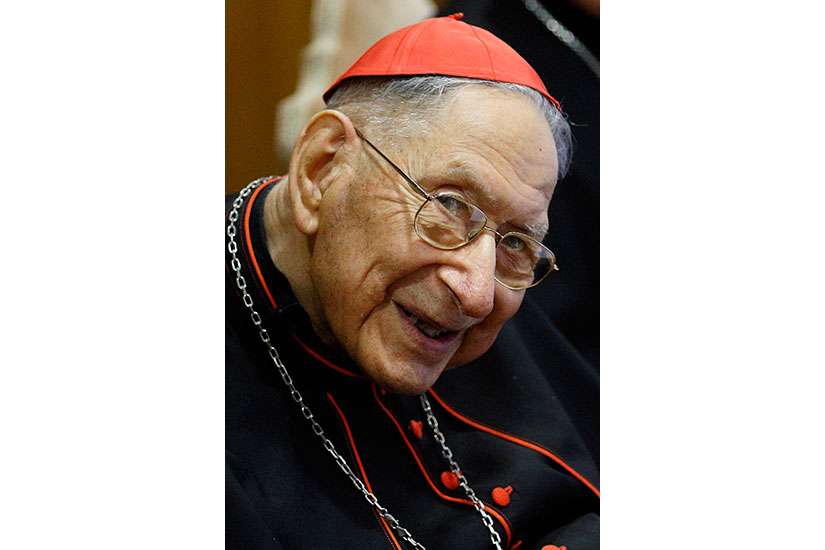Sending his condolences to the Swiss cardinal's sister, Pope Francis said he would be remembered particularly for "his strong faith, paternal kindness and intense cultural and ecclesial activity, especially in the service of Popes John Paul II and Benedict XVI as theologian of the papal household."
The cardinal's funeral is scheduled for April 2 in St. Peter's Basilica. Cardinal Angelo Sodano, dean of the College of Cardinals, was to preside at the Mass. Pope Francis was scheduled to officiate over the final commendation.
Cardinal Cottier, a Dominican, had served as a theological expert at the Second Vatican Council, as secretary of the International Theological Commission and was theologian of the papal household from 1989 to 2005, retiring at the age of 83.
Just before retiring, he told Catholic News Service that the papal theologian's main task is to vet the many thousands of words prepared by Vatican aides for the pope to speak or publish. He checks for statements of dubious theology and otherwise hazardous phrases that could come back to haunt the pope.
Part of the task, the cardinal said, is to be careful not to make the pope say too much about some topics. "By this, I mean that when we have a theological issue that is still open to discussion and study, it's not a good thing that the pope pronounce on it too early. Because when the pope speaks with authority, it means the discussion is closed," he said.
Well into retirement, Cardinal Cottier was a featured speaker at Vatican conferences and was an expert sought out by Catholic media.
In an interview in July on God's mercy and family life, the cardinal said the Catholic Church must develop better ways to accompany people and not simply condemn those who fail.
"In rigourism, there is an innate brutality that is contrary to the delicacy with which God guides each person," the cardinal had told La Civilta Cattolica, a Jesuit journal.
"Some people have been scandalized by the Church because of a negative judgment issued in an impersonal and soulless way," Cardinal Cottier said. "They have felt driven away, rejected in a serious manner."
While the Church's ministers must uphold Church teaching, he said, "this must be presented and explained in a language that clearly transmits the maternal concern of the Church."
Cardinal Cottier had served as president of the Vatican Theological-Historical Commission that prepared the way for the Church's major "mea culpa" statements of Holy Year 2000, treating such specific themes as the Inquisition and Christians' treatment of Jews.
Amid some controversy, the commission insisted the Church could and should ask forgiveness for the past sins of its members, while distinguishing between the holiness of the Church and the sometimes sinful behaviour of individual Christians.
In professing belief in the "communion of saints," Cardinal Cottier argued, the Church asserts a link among its members throughout history. He said the Church has an obligation to acknowledge "those things which were right to do and those which should not have been done and ask forgiveness for them."
Asking forgiveness for historical wrongs has a practical value, he added, because "there are some facts which cast shadows and are an obstacle to evangelization."
In an interview in 2013 for the CNS documentary, Voices of Vatican II, Cardinal Cottier spoke of his experience at the council and particularly about the council discussions of religious liberty, relations with the Jews and liturgical reform. But he also spoke about people's understanding of and interpretations of the council's declarations.
"The liturgical reform went badly, I would say. The document is beautiful, but the bishops didn't handle it well, at least not in Switzerland and France," he said. "Every pastor did what he liked."
In general, problems in the Church over the past 50 years are due less to the council than to "this idea of 'the spirit of the council.' It had already appeared during the council, coming from people who weren't at the council," he said. "They attributed to the council things that were not actually thought of at the council."
Georges Cottier was born April 25, 1922, in Carouge, Switzerland. He joined the Dominican order in 1945, was ordained a priest in 1951 and studied at Rome's Angelicum University from 1946 to 1952. St. John Paul named him a cardinal in 2003.
His death leaves the College of Cardinals with 215 members, 116 of whom are under the age of 80 and therefore eligible to vote in a conclave.


